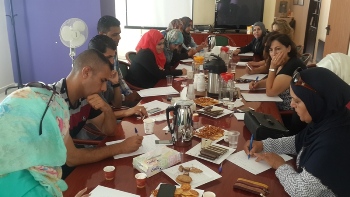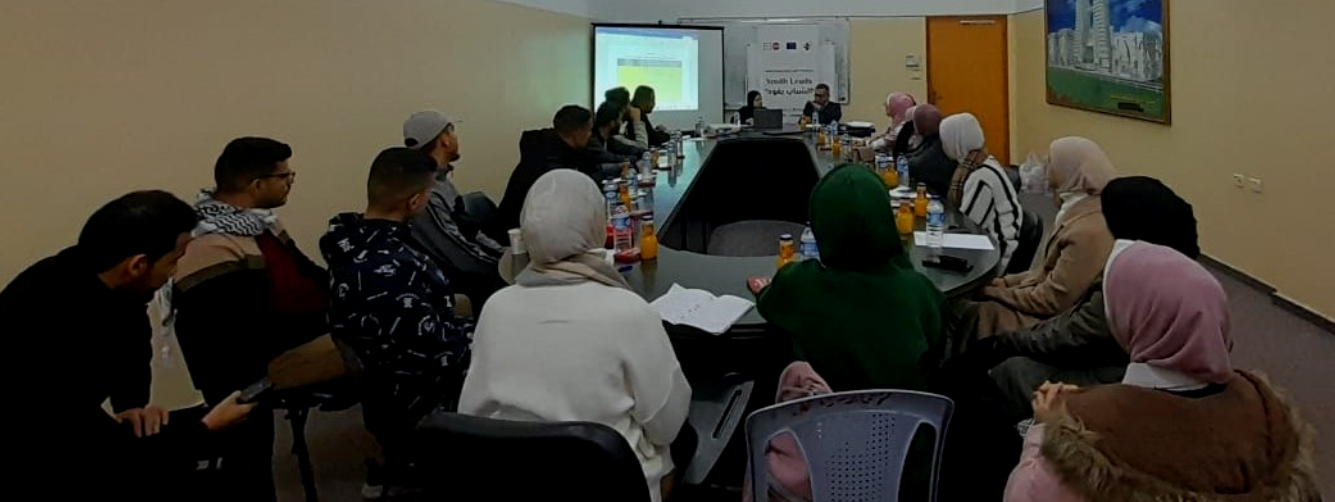
Ramallah – MIFTAH recently capped off a number of awareness meetings on the performance of leaders from the National Coalition for Resolution 1325 regarding reproductive and sexual health rights. The members were from Nablus, Hebron, Jericho and the Jordan Valley and had previously participated in a training course on May 4, 2015. The training was aimed at providing them with the information and skills needed to educate people on subjects pertaining to sexual and reproductive right, especially in marginalized areas where health and educational services are not up to par. This, they maintained, required immediate intervention from civil society organizations to pressure for improved services in these areas.
The session was to evaluate the performance of the coalition members in how they imparted information and the extent of its implementation in the field.
The session was carried out within the framework of the “Women’s Protection Support ” Program, which is funded by UNFPA and focuses on promoting the abilities of coalition organizations in the field of reproductive health. It is also related to MIFTAH’s interest in promoting grassroots organizations in raising awareness to issues such as violence against women and gender-based violence, and creating a movement that could impact public policies and a system of national laws and legislations. This is particularly relevant since the PA’s laws and legislations now coincide with international agreements signed by the President.
Basic needs
The evaluation session showed there is a need within communities for education and awareness on issues such as early marriages and its impact on women and girls’ reproductive health. The presenters also broached the dangers of marrying relatives given that it is a prevalent practice in some districts. There was a kind of social acceptance from the women to the subjects being posed, namely reproductive and sexual health from the premise that it is their right to access information and easily reach and enjoy quality services. They also understood their right to document medical mistakes, a subject which was linked to international agreements related to the rights of reproductive and sexual health.
The participants reaffirmed the need for raising the awareness of girls in the 14 and 15 year-old age group about marriage, which was followed by several discussions in relation to the CEDAW Agreement, calling on the women to raise awareness of girls between 14 and 18 on this subject.
Early marriage
One participant who has been an activist in women’s organizations since 2006, said she was personally satisfied with the progress made when visiting the more remote areas. “When I give a workshop on early marriage for example, I’m shocked at how little these women know, how little information they have.” In particular, she spoke of the marginalized areas where she said the weddings involved girls as young as 15 and boys who were 16. “This is when we feel good about ourselves, when we can give them the information and make changes.”
Another participant said she was accustomed to giving workshops on political and gender-based violence and that this was the first time she gave a workshop on health. “I was really happy because this is the first time we ever addressed these subjects. It is something women suffer from daily.”
Eager for information
One activist said she was only partially satisfied with the training. “There was not enough time spent on sexually transmitted diseases,” she said. “There is a hunger for information about sex education; I was so shocked about how much university students, studying law, media and psychology, were eager for more information.” She said they worked with the students on how to handle these subjects in the media, how not to harm the victim. “They asked for more lectures on laws about violence and documentation. They clearly wanted to learn more.”
It was clear the targeted group needed more awareness-raising sessions on subjects such as sexual harassment of children in particular and on ways to protect them from violence. This includes education on subjects such as: positive child-rearing, the stage of adolescence, reproductive health and even subjects such as osteoporosis.
Married and elderly women
The awareness sessions also showed that each group of the targeted sector required exclusive needs. Married and older women had needs that differed from young girls who were still in school.
One participant said she differentiated between the various sectors in terms of the subjects she broached. “For example, with the older women, I would speak about menopause and early marriage (of their children)”.
More extensive training
Some participants in the training expressed the need for more extensive information on health issues, saying they resorted to other sources such as the Ministry of Health and booklets from the Family Planning Association for this information.
One leader/trainer who works in the police force said Resolution 1325 and CEDAW were at the heart of the police’s work. “There is a clear link between health, development and security of the targeted sectors.”
Success Stories
It was clear from the evaluation session and discussions that there is a need in schools to raise the awareness of female students on the subjects of early marriage, especially in areas where this and marriage between relatives is common.
Several success stories emerged from the sessions, including stories about women who married early but refused to marry off their daughters at an early age. The trainers also said the women were more open in sharing some of their health issues with the others, thus creating more positive participation in the awareness sessions.
The challenges
Mostly, the awareness session revealed that many women needed more education on the CEDAW agreement and Resolution 1325. Furthermore, the time constraints of the awareness sessions – ranging from 1.5 to two hours each – was not enough and could not cover the subjects comprehensively. There were also not enough sessions, which was another challenge that must be taken into consideration.








